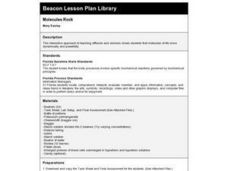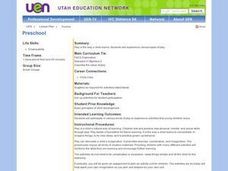Teach Engineering
Rock Candy Your Body
Candy rocks! A sweet lesson offers a different take on the rock candy experiment. Groups use a supersaturated sugar solution to create rock candy. Pupils then add other ingredients to the solution to test their effect on the...
Chymist
Determination of the Volume of CO2 in Pop Rocks
Where does the pop in pop rocks come from? An engaging activity asks scholars to measure the amount of carbon dioxide in a package of Pop Rocks candy. Learners dissolve the candy in water and use the solubility of CO2 to determine its mass.
Curated OER
Pet Rocks
Students complete a variety of activities related to the physical characteristics of minerals. They classify and group candy, classify rocks and complete a Pet River Rock worksheet. Students try to guess which rock goes with each...
It's About Time
Chemistry and Physical Changes
Engage the class like never before as pupils learn to differentiate between multiple physical and chemical changes by conducting a list of small experiments, most often with household materials. They make observations and discuss the...
Curated OER
Data Analysis and Probability: Graphing Candy with Excel
Collect and graph data using Microsoft Excel with your math class. They will make predictions about the number of each colored candy in a bag of M&M's, then sort, classify, count, and record the actual data before using Excel to...
Curated OER
Growing Crystals
Students explore the different types, visual appearance and creation of crystals. They grow an edible crystal - rock candy.
Curated OER
The Geology of a Snicker’s Bar: Tectonic Plates
Students explore the layers of the Earth using a Snicker's bar. In this science lesson, students identify the parts of the Snicker's bar and identify which layer of the Earth the parts of the candy bar would represent. Students discuss...
Curated OER
Molecules Rock
Fourth graders engage in this interactive lesson which illustrates diffusion and osmosis and shows them that molecules of life move dynamically and powerfully. They must analyze their lab orally and in writing.
Curated OER
Smoothing Out the Rough Spots
Fifth graders experiment to observe the changes created on a surface by mechanical action of water with varying amounts of mineral content and abrasive qualities. They write the predictions of their outcomes and describe all of their...
Curated OER
Ice Cream Blizzards
Fourth graders explore whether the making of homemade ice cream is a physical change or a chemical change in a lab experiment. Students identify states of matter, describe the physical properties of states, and collect temperature data...
Curated OER
Preschool
Learners experience various types of play. They determine play is the way a child learns and describe the value of play. They discover that play is a child's natural way of learning and that children test and practice new physical,...
Curated OER
Physical Properties Of Coal
Students examine and identify the observable properties of coal. After a lecture/demo, students perform a simple experiment. They observe samples of coal and record data in an organized manner.
Curated OER
What's the Matter? Where Did it Go?
Eighth graders analyze questions posted on a large poster in the room and work in groups to record their response to the question on paper, rotating to the next question after two minutes have passed. They review the characteristics of...
Science Buddies
Science Buddies: When Science Is Sweet: Growing Rock Candy Crystals
Though rock candy seems to be a simple enough treat, it is also pretty interesting to make. Crystallized sugar that can be grown from a sugar-water solution is just how rock candy is made. In this experiment, you will learn to make your...
Science Bob Pflugfelder
Science bob.com: Make Your Own Rock Candy!
This concise site provides directions for creating rock candy using a super-saturated sugar water solution. Describes super-saturation following the procedure.
American Museum of Natural History
American Museum of Natural History: O Logy: Stuff to Do: Grow Rock Candy
Learn about the crystal patterns and shapes of select minerals (diamond, quartz, muscovite, and topaz) and how to grow your own rock candy crystals.
















